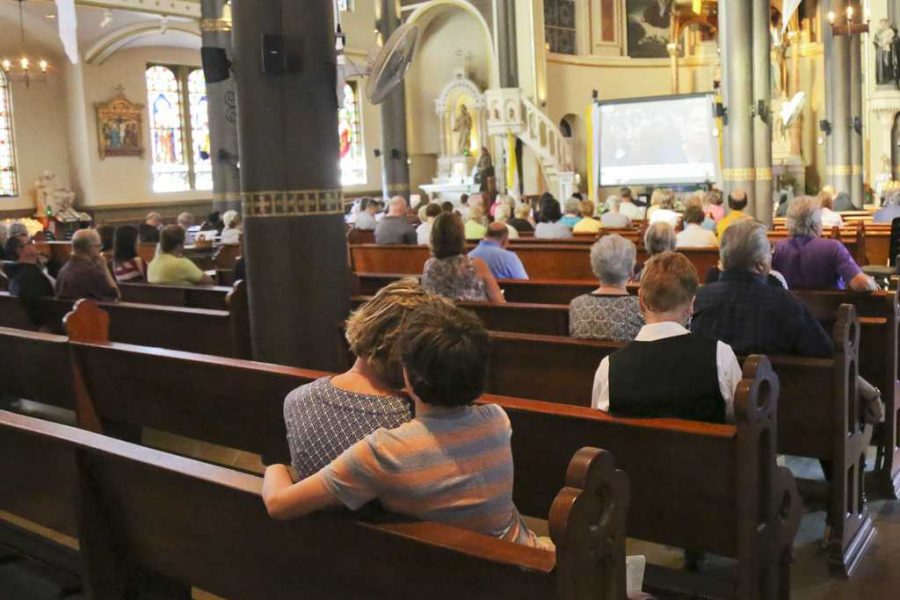As the Steelers game came to a close Sunday, Pittsburgh’s faithful turned away from their televisions and toward someone more holy than any quarterback — Pope Francis.
About 130 people gathered yesterday afternoon at St. Stanislaus Kostka Church in the Strip District to watch a live broadcast from Philadelphia of Pope Francis’ final Mass before he left the United States.
St. Stanislaus Kostka was the only church in Pittsburgh to broadcast the event. Three-hundred miles east, 30 Pitt students traveled with the Ryan Catholic Newman Center to Philadelphia to attend the speech. Pope Francis concluded his first six-day tour of the United States Sunday night as he left Philadelphia and returned to Rome.
“The Steelers game was at 1, and the Pirates game is at 8, so we hoped this would fit in,” Bob Butter, a member of the St. Patrick-St. Stanislaus parish of St. Stanislaus Kostka Church, said.
EWTN, an American Catholic-sponsored television network, broadcast the Mass, which drew a crowd estimated in the hundreds of thousands to a temporarily closed section of Philadelphia’s Benjamin Franklin Parkway.
The prospect of hearing Francis’ address drew a crowd that nearly filled the historic St. Stanislaus Kostka Church.
At the entrance of the sanctuary, a life-sized cutout of Francis greeted the congregation. Some gasped when they saw it, mistaking it for Francis himself. During the Mass, the congregation was serene and one boy quietly put his arm around his mother.
Butter, who helped organize the event, said he hoped the live stream filled an important need — letting Catholics hear their Pope — in Pittsburgh.
“We just wanted to invite people. No one else [in Pittsburgh] was doing this, so we thought we should,” Butter said.
While people watched the speech from afar at St. Stanislaus Kostka, a group of 30 Pitt students got to experience the event firsthand.
Pitt’s Newman Center took 30 students to Philadelphia on Friday to listen to Francis speak. The students paid for the trip out of pocket and had been planning to go since the spring, according to club president Brittney Brueggman, a senior speech language pathology major.
“It was an amazing experience, just being a part of such a momentous occasion,” Brueggman said. “There were millions of people there, which should create chaos but it was so calm.”
Brueggman said everyone took away something different from the speech, but for her, it was about being a part of the Catholic community.
“It’s such a unifying thing to be there with so many people interested in this public figure,” she said. “To some extent, [the pope is] a celebrity, but to most of us, it was that he stood for more than himself.”
For Ana Pomales, another Catholic Pitt student, Francis’ visit and his speechs to minority populations were important because it showed he cared about everyone, regardless of their faith. Even for non-Catholics, Pomales said, the pope asking people to pray for him showed his humility.
“I think it’s cool he’s reaching out,” Pomales, a junior psychology major, said. “I think he’s demonstrated he’s the pope [for] everyone.”
Father Harry Nichols, pastor of St. Patrick-St. Stanislaus Parish, said the pope’s American journey was historic.
“We thought we’d have a Pittsburgh connection with Philadelphia,” Nichols said.
Derris Jeffcoat, St. Stanislaus Kostka’s sacristan and historian, said without the event, many people who wanted to hear the pope’s message would have missed out — even those who watched it at home would have missed the important experience of coming together to worship.
“The community is essential,” Jeffcoat said.
Community, especially worshiping as a group in Mass, is one of the most important parts of Catholicism.
According to Jeffcoat, Monday’s event wasn’t the first time St. Stanislaus Kostka has hosted a pope — virtually or otherwise. In 1969, he said, then-Cardinal Karol Wojtyla, who later became Pope John Paul II, visited the church to pray during a visit to the United States.
In his homily, Francis repeated the themes of openness and acceptance of outsiders that also characterized his earlier public statements during his visit to the United States.
“The temptation to be scandalized by the freedom of God, who sends rain on the righteous and unrighteous alike, bypassing bureaucracy, officialdom and inner circles, threatens the authenticity of faith,” Francis said. “Hence, it must be vigorously rejected.”
Francis said to refuse to believe that the Holy Spirit can work in outsiders and members of marginalized groups is a “dangerous temptation” and a “perversion of faith.”
“Our common house can no longer tolerate sterile divisions,” Francis said.
Francis delivered the homily in his native Spanish, one of four languages he used during the Mass. Francis also spoke in English and Latin, while hymns and readings alternated between English, Spanish and Vietnamese.
According to Butter, because EWTN published guidelines for those who wanted to live stream its broadcast, he and his fellow organizers faced no technical difficulties when setting up.
“We didn’t know what to expect,” Jeffcoat said. “We’re just glad we were able to have an open door and open it to everyone.”


